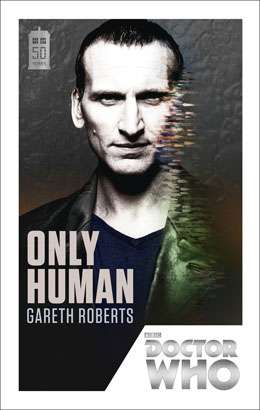As Captain Jack sets about the difficult task of acclimating Das to the culture of the early 21st century, The Doctor and Rose follow the trail back to the dawn of humanity. It is there they find a hidden colony of humans - all of them with movie-star good looks and glazed, emotionless expressions. They also find Chantal Osterberg, whose plans for humanity can't be properly called "mad" as she has eradicated madness along with all of the other deviant mental states, such as depression, anger and unhappiness.
Can our heroes save the human race from extinction? Yes, but not unless The Doctor becomes the God of the Horses, Rose introduces manicures to humanity several thousand years early and Captain Jack manages to explain that Mrs. Slocombe from Are You Being Served is not real to a crisp-addicted caveman.

Gareth Roberts has fast become one of my favorite Doctor Who writers, not only for his wit but for his versatility. Even if you don't enjoy the multiple media of Doctor Who, you've likely chuckled at his work in episodes such as The Shakespeare Code and The Unicorn and The Wasp. He's written novels, audio plays, a stage-play and comics as well as episodes of the show and proven equally capable of writing in all mediums skillfully.
Reading Only Human, one wishes that Roberts had been on the writing team for Series One. This would have been a great story to see adapted into a shooting script. Roberts does a grand job of capturing the essence of the characters and one wishes we could have seen Christopher Eccleston trying to be sarcastic towards a villain who has chemically removed his ability to be sarcastic.
Despite that, I can't help but think perhaps it is best that this story stayed a novel, as the greatest moments of the book involve elements that would not translate well to other media. For example, rather than writing out the action of Jack and Das' misadventures in modern London, Roberts' relates these events to us through the personal diaries of both men. Roberts also avoids the easy jokes one might expect from a film like Encino Man and derives just as much humor from Jack's frustration at being stuck in such a primitive (from his perspective) and boring point in time as he does from Das' failure to grasp basic concepts such as lying and fiction. One wonders how much of this sequence and the base idea of a time-traveler trying to acclimate to an ordinary existence inspired Roberts' later work on The Lodger.
If this book has a flaw, it is that the character moments and comedy are far more riveting than the actual plot. The story is fairly standard stuff for Doctor Who and the villain is ultimately a bargain basement Davros. But readers are likely to forgive this since Roberts disguises the drab plot with such glorious moments as Captain Jack streaking to provide "one of the biggest distractions you'll ever see", the swear-filter on the TARDIS translator causing a group of primeval humans to sound like the cast of EastEnders and the revelation that psychic paper also works on animals.
Bottom Line: Only Human perfectly captures the feeling of a Ninth Doctor era story. If you like New Who, you'll love it.

No comments:
Post a Comment